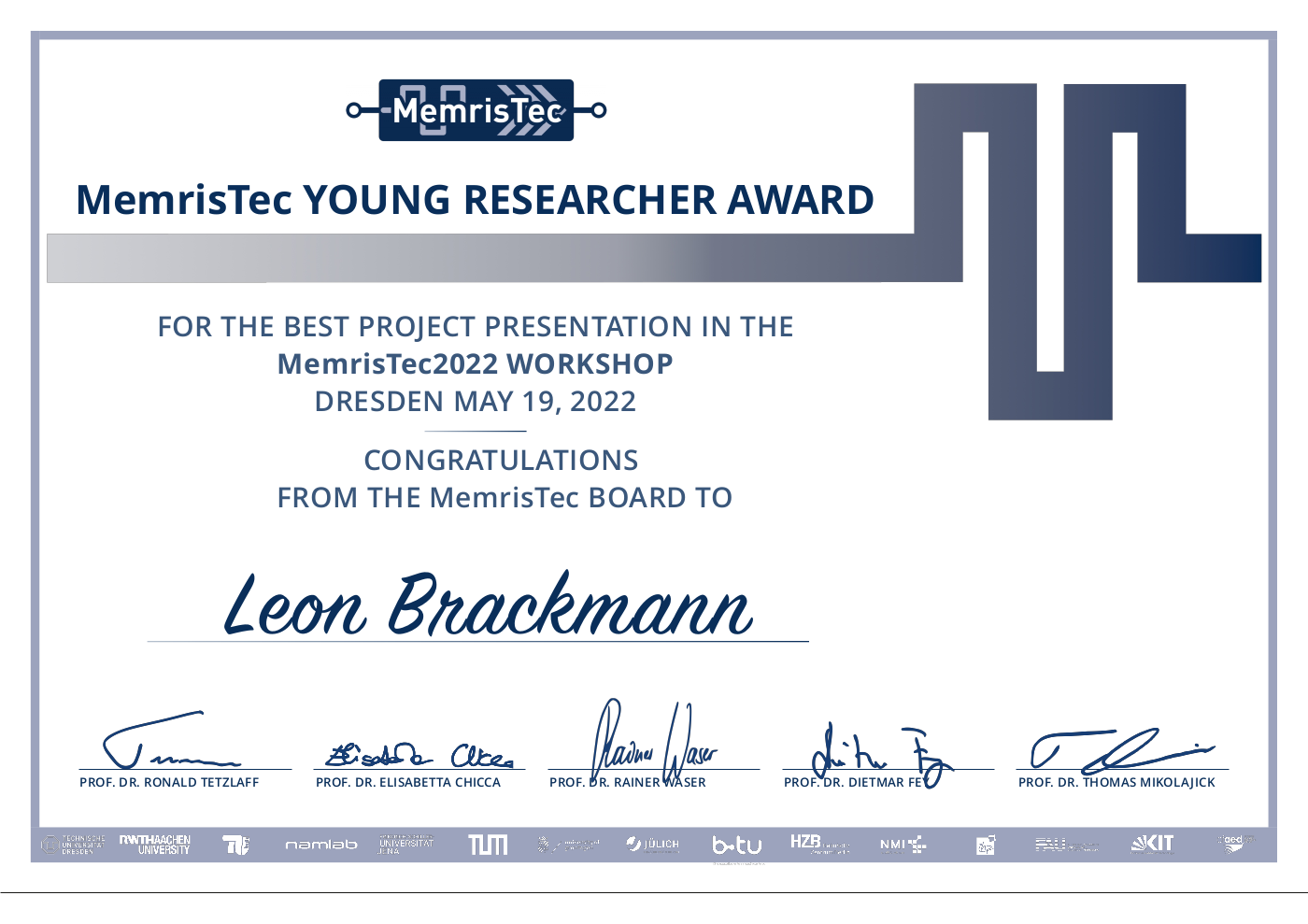Feng Liu, Leon Brackmann, Xianyue Zhao, Nan Du, Rainer Waser, Stephan Menzel
Philosophical Transactions of the Royal Society, 16 January 2025
Feng Liu, Leon Brackmann, Xianyue Zhao, Nan Du, Rainer Waser, Stephan Menzel
Philosophical Transactions of the Royal Society, 16 January 2025
Leon Brackmann, Tobias Ziegler, Atousa Jafari, Dirk J. Wouters, Mehdi B. Tahoori, Stephan MenzelLeon Brackmann, Tobias Ziegler, Atousa Jafari, Dirk J. Wouters, Mehdi B. Tahoori, Stephan Menzel
Wiley Advanced, 27 December 2023
Jörg Henkel, Lokesh Siddhu, Lars Bauer, Jürgen Teich, Stefan Wildermann, Mehdi Tahoori, Mahta Mayahinia, Jeronimo Castrillon, Asif Ali Khan, Hamid Farzaneh, João Paulo C. de Lima, Jian-Jia Chen, Christian Hakert, Kuan-Hsun Chen, Chia-Lin Yang, Hsiang-Yun Cheng
Proceedings of the 2023 International Conference on Compilers, Architecture, and Synthesis of Embedded Systems (CASES), Sep 2023
DOI: tba
Vincent Rietz; Christopher Münch, Mahta Mayahinia, Mehdi Tahoori
it - Information Technology, Vol. 65, 1-2, pages 13–29, 03.05.2023

A. Jafari; C. Bengel; M. Mayahinia; R. Waser; D. Wouters; S. Menzel; M. Tahoori
2022 IEEE International Test Conference in Asia (ITC-Asia), 24-26 August 2022, Taipei, Taiwan
D. J. Wouters; L. Brackmann; A. Jafari; C. Bengel; M. Mayahinia; R. Waser; S. Menzel; M. Tahoori
2022 International Electron Devices Meeting (IEDM), 03-07 December 2022, San Francisco, CA, USA
Emerging applications (such as Internet-of-Things and Big Data analytics) are posing serious challenges on current computer architectures and technologies. Therefore, there is an urgent need to explore alternative architectures, not only to further increase the computing efficiency at lower cost, but also to further reduce the overall energy. Further, new device technologies are emerging that, in combination with new architectures, may compete with no-longer-scaling CMOS.
Moving computation to memory (data-centric computing) is an emerging computing paradigm shown to have a huge potential in terms of overall computing efficiency. This computing paradigm is also referred to as Computation-in-Memory (CIM). Moving the computation to the memory (rather than doing it in the CPU) will significantly reduce the communication and therefore reduce the power consumption and increase the performance.
The most promising solutions for CIM architectures are based on the use of emerging device technologies, such as resistive or magneto-resistive devices, that are able to act as both storage and information processing unit. These, more generally called memristive devices, reduce the overall energy consumption as the devices are non-volatile and the leakages is practically zero, and also they do not require any refresh as it is the case for DRAM, etc. Hence, memristive devices favour increasing system complexity and performance at lower power consumption; thus, providing the scientific community with opportunities for new computer architecture innovations being able to track today’s limitation.
However, realizing such a paradigm strongly depends on the development of high quality, reliable and power efficient circuit primitives that enable both storage and computing.This project aims at designing and demonstrating high quality, reliable, robust and energy efficient primitive circuits based on memristive devices to enable computation-in-memory architectures. In particular, we aim at the development of robust CIM circuits based on memristive device by i) carefully modeling and analyzing the effects of memristive device (un)reliability on CIM operation and ii) develop reliability-aware and fault/variation tolerant design of CIM circuits.

